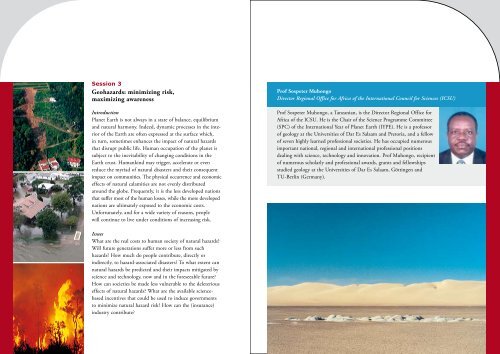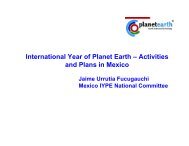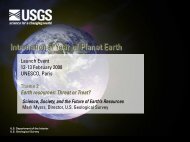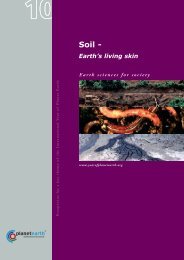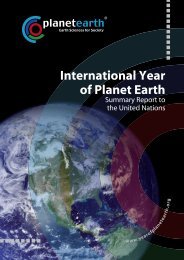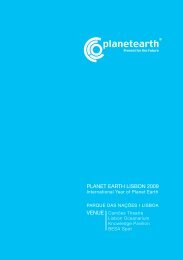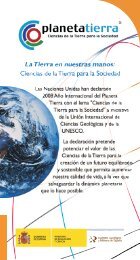2 0 0 8 U N E S C O P A R I S - International Year of Planet Earth
2 0 0 8 U N E S C O P A R I S - International Year of Planet Earth
2 0 0 8 U N E S C O P A R I S - International Year of Planet Earth
You also want an ePaper? Increase the reach of your titles
YUMPU automatically turns print PDFs into web optimized ePapers that Google loves.
Session 3<br />
Geohazards: minimizing risk,<br />
maximizing awareness<br />
Introduction<br />
<strong>Planet</strong> <strong>Earth</strong> is not always in a state <strong>of</strong> balance, equilibrium<br />
and natural harmony. Indeed, dynamic processes in the interior<br />
<strong>of</strong> the <strong>Earth</strong> are <strong>of</strong>ten expressed at the surface which,<br />
in turn, sometimes enhances the impact <strong>of</strong> natural hazards<br />
that disrupt public life. Human occupation <strong>of</strong> the planet is<br />
subject to the inevitability <strong>of</strong> changing conditions in the<br />
<strong>Earth</strong> crust. Humankind may trigger, accelerate or even<br />
reduce the myriad <strong>of</strong> natural disasters and their consequent<br />
impact on communities. The physical occurrence and economic<br />
effects <strong>of</strong> natural calamities are not evenly distributed<br />
around the globe. Frequently, it is the less developed nations<br />
that suffer most <strong>of</strong> the human losses, while the more developed<br />
nations are ultimately exposed to the economic costs.<br />
Unfortunately, and for a wide variety <strong>of</strong> reasons, people<br />
will continue to live under conditions <strong>of</strong> increasing risk.<br />
Pr<strong>of</strong> Sospeter Muhongo<br />
Director Regional Office for Africa <strong>of</strong> the <strong>International</strong> Council for Sciences (ICSU)<br />
Pr<strong>of</strong> Sospeter Muhongo, a Tanzanian, is the Director Regional Office for<br />
Africa <strong>of</strong> the ICSU. He is the Chair <strong>of</strong> the Science Programme Committee<br />
(SPC) <strong>of</strong> the <strong>International</strong> <strong>Year</strong> <strong>of</strong> <strong>Planet</strong> <strong>Earth</strong> (IYPE). He is a pr<strong>of</strong>essor<br />
<strong>of</strong> geology at the Universities <strong>of</strong> Dar Es Salaam and Pretoria, and a fellow<br />
<strong>of</strong> seven highly learned pr<strong>of</strong>essional societies. He has occupied numerous<br />
important national, regional and international pr<strong>of</strong>essional positions<br />
dealing with science, technology and innovation. Pr<strong>of</strong> Muhongo, recipient<br />
<strong>of</strong> numerous scholarly and pr<strong>of</strong>essional awards, grants and fellowships<br />
studied geology at the Universities <strong>of</strong> Dar Es Salaam, Göttingen and<br />
TU-Berlin (Germany).<br />
Issues<br />
What are the real costs to human society <strong>of</strong> natural hazards?<br />
Will future generations suffer more or less from such<br />
hazards? How much do people contribute, directly or<br />
indirectly, to hazard-associated disasters? To what extent can<br />
natural hazards be predicted and their impacts mitigated by<br />
science and technology, now and in the foreseeable future?<br />
How can societies be made less vulnerable to the deleterious<br />
effects <strong>of</strong> natural hazards? What are the available sciencebased<br />
incentives that could be used to induce governments<br />
to minimize natural hazard risk? How can the (insurance)<br />
industry contribute?


